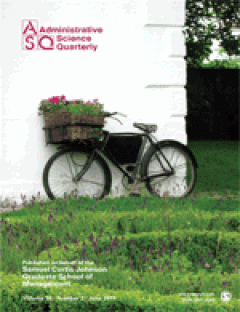Filter by

Hong Kong's Role in Mainland China's Logistics Industry
The importance of Hong Kong's role as fnancier, coach, and physical gateway in the development of container ports and highways in China is diminishing. However, the development of the global supply chain transcends physical boundaries: Hong Kong adapts continuously, and is now taking on bridging and differentiating roles in third-party logistics services.
- Edition
- Vol. 51, No. 4, July/August 2011, pp. 659-682
- ISBN/ISSN
- 00044687
- Collation
- -
- Series Title
- Asian Survey
- Call Number
- -

Value Changes and Legitimacy Crisis in Post-industrial Hong Kong
Social, political, and economic changes in post-industrial Hong Kong brought a less instrumental view of democracy, more skepticism against the neoliberal regime, and more support for post-materialist values. The changing values make the old legitimacy formula obsolete, creating a legitimacy crisis for the undemocratic, business-dominated, and low-interventionist government.
- Edition
- Vol. 51, No. 4, July/August 2011,pp. 683-712
- ISBN/ISSN
- 00044687
- Collation
- -
- Series Title
- Asian Survey
- Call Number
- -

Who's Influencing Whom? Exploring the Influence of Hong Kong on Politics and …
This paper explores how Hong Kong has influenced Chinese politics and governance in the constitutional, political, ideational, and intergovernmental dimensions since 1997. Despite the growing political and economic impact of the Mainland on the Hong Kong Special Administrative Region, the latter has continued to influence the Mainland, especially southern China.
- Edition
- Vol. 51, No. 4, July/August 2011,pp. 713-738
- ISBN/ISSN
- 00044687
- Collation
- -
- Series Title
- Asian Survey
- Call Number
- -

Hong Kong's Contribution to Mainland China's Property Sector
Hong Kong property developers helped Shanghai become a "global city," revitalizing the city core, hosting multinational corporations, and attracting global talent. They transformed the property sector's standards, urban life, and government revenues. Ironically, Shanghai's challenge to Hong Kong is derived from innovations by the same developers who created Hong Kong's remarkable property market.
- Edition
- Vol. 51, No. 4, July/August 2011, pp. 739-768
- ISBN/ISSN
- 00044687
- Collation
- -
- Series Title
- Asian Survey
- Call Number
- -

The Influence of Hong Kong's Policing on China
Police cooperation includes joint anti-crime campaigns, intelligence sharing, evidence collection, as well as mutual exchanges and training. Mainland police have been impressed by the Hong Kong police's practices of operating in accordance with the Police Order, their use of handbooks, the rotation of offcers, and the services of psychological counseling. Knowledge transfer in policing has take…
- Edition
- Vol. 51, No. 4, July/August 2011, pp. 770-784
- ISBN/ISSN
- 00044687
- Collation
- -
- Series Title
- Asian Survey
- Call Number
- -

Rotating Leadership and Collaborative Innovation : Recombination Processes in…
Using a multiple-case, inductive study of eight technology collaborations between ten organizations in the global computing and communications industries between 2001 and 2006 this paper examines why some interorganizational relationships produce technological innovations while others do not. Comparisons of more and less innovative collaborations show that high-performing collaborative innovati…
- Edition
- Vol. 56 no. 2, June 2011,pp. 159-201
- ISBN/ISSN
- 00018392
- Collation
- -
- Series Title
- Administrative Science Quarterly
- Call Number
- -

Executive Personality, Capability Cues, and Risk Taking : How Narcissistic CE…
We adopt an interactionist logic to study the determinants of risk taking by chief executive officers (CEOs). We introduce the concept of �capability cues��contextual signals that decision makers might reasonably interpret as indicators of their current level of overall ability�arguing that positive cues will induce boldness, while negative cues will induce timidity. Then, drawing from prior th…
- Edition
- Vol. 56 no. 2, June 2011,pp. 202-237
- ISBN/ISSN
- 00018392
- Collation
- -
- Series Title
- Administrative Science Quarterly
- Call Number
- -

How Product Order Affects Market Identity : Repertoire Ordering in the U.S. O…
In this study, we view market identities as interfaces between organizations and their external audiences and examine how the perceived market appeal of organizations can be influenced by the order in which the products or product features that determine their market identities are offered. We theorize that when audiences have different product preferences, organizations may increase their perc…
- Edition
- Vol. 56 no. 2, June 2011,pp. 238-256
- ISBN/ISSN
- 00018392
- Collation
- -
- Series Title
- Administrative Science Quarterly
- Call Number
- -

Set up for a Fall : The Insidious Effects of Flattery and Opinion Conformity …
This study considers the potentially negative consequences for corporate leaders of being subjected to high levels of ingratiation in the form of flattery and opinion conformity from other managers and board members. Chief executive officers (CEOs) who have acquired positions of relatively high social status in the corporate elite tend to be attractive targets of flattery and opinion conformity…
- Edition
- Vol. 56 no. 2, June 2011,pp. 257-302
- ISBN/ISSN
- 00018392
- Collation
- -
- Series Title
- Administrative Science Quarterly
- Call Number
- -

The Global Context
Although the Arab revolts have a long way to go before they can be counted as gains for democracy, they do underline what is perhaps democracy�s greatest source of strength worldwide--its superior legitimacy.
- Edition
- Volume 22, Number 4, October 2011,pp. 5-12
- ISBN/ISSN
- 10455736
- Collation
- -
- Series Title
- Journal of Democracy
- Call Number
- -

The Lessons of 1989
The Arab events of 2011 may have some similarities to the wave of popular upheavals against authoritarianism that swept the Soviet bloc starting in 1989, but the differences are much more fundamental.
- Edition
- Volume 22, Number 4, October 2011,pp. 13-23
- ISBN/ISSN
- 10455736
- Collation
- -
- Series Title
- Journal of Democracy
- Call Number
- -

The Role of the Military
Across the Arab world, militaries have played a key role in determining whether revolts against dictatorship succeed or fail. What factors determine how and why �the guys with guns� line up the way they do?
- Edition
- Volume 22, Number 4, October 2011,pp. 24-35
- ISBN/ISSN
- 10455736
- Collation
- -
- Series Title
- Journal of Democracy
- Call Number
- -

The Impact of Election Systems
Methods of electing legislatures are fraught with consequences for the shape and quality of democracy, and must balance a number of competing goals. Amid the current political ferment of the Arab world, what kinds of electoral systems are emerging and what will they mean for democratic hopes there?
- Edition
- Volume 22, Number 4, October 2011,pp. 36-47
- ISBN/ISSN
- 10455736
- Collation
- -
- Series Title
- Journal of Democracy
- Call Number
- -

Is Saudi Arabia Immune?
Saudi Arabia looked for a time in early 2011 as if it too would become swept up in the Arab uprising. Yet it never quite happened--why?
- Edition
- Volume 22, Number 4, October 2011,pp. 48-59
- ISBN/ISSN
- 10455736
- Collation
- -
- Series Title
- Journal of Democracy
- Call Number
- -

Nigeria Votes : More Openness, More Conflict
Nigeria�s 2011 presidential election offered its citizens the most competitive and transparent contest in decades, but also the bloodiest.
- Edition
- Volume 22, Number 4, October 2011,pp. 60-74
- ISBN/ISSN
- 10455736
- Collation
- -
- Series Title
- Journal of Democracy
- Call Number
- -

A Vote for Moderate Change
Despite the presidential victory of Ollanta Humala, Peru�s 2011 elections had some continuities with the 2006 contest. The electorate is dividing along regional and socioeconomic rather than partisan lines.
- Edition
- Volume 22, Number 4, October 2011,pp. 75-83
- ISBN/ISSN
- 10455736
- Collation
- -
- Series Title
- Journal of Democracy
- Call Number
- -

A Surprising Left Turn
In a runoff between candidates with dubious democratic credentials, former antisystem outsider Ollanta Humala defeated Keiko Fujimori by attracting votes from the middle class.
- Edition
- Volume 22, Number 4, October 2011,pp. 84-94
- ISBN/ISSN
- 10455736
- Collation
- -
- Series Title
- Journal of Democracy
- Call Number
- -

Reluctant India
Though justly vaunted as the world�s largest democracy, India will in all likelihood remain reluctant to take on the mantle of �democracy promoter� for a mix of historical, ideological, and strategic reasons.
- Edition
- Volume 22, Number 4, October 2011,pp. 97-109
- ISBN/ISSN
- 10455736
- Collation
- -
- Series Title
- Journal of Democracy
- Call Number
- -

Indonesia Finds a New Voice
Since its transition to democracy barely a decade ago, Indonesia has begun projecting its newly democratic values across international borders. So far, however, its efforts have been largely rhetorical.
- Edition
- Volume 22, Number 4, October 2011,pp. 110-123
- ISBN/ISSN
- 10455736
- Collation
- -
- Series Title
- Journal of Democracy
- Call Number
- -

Turkey’s Dilemmas
Long an �ultrarealist� power, Turkey has over the last decade begun taking human rights and democracy more seriously as aspects of its diplomacy, albeit still in a decidedly selective way.
- Edition
- Volume 22, Number 4, October 2011,pp. 124-138
- ISBN/ISSN
- 10455736
- Collation
- -
- Series Title
- Journal of Democracy
- Call Number
- -
 Computer Science, Information & General Works
Computer Science, Information & General Works  Philosophy & Psychology
Philosophy & Psychology  Religion
Religion  Social Sciences
Social Sciences  Language
Language  Pure Science
Pure Science  Applied Sciences
Applied Sciences  Art & Recreation
Art & Recreation  Literature
Literature  History & Geography
History & Geography